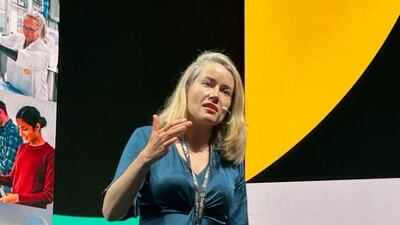The founder of Wikipedia has told a technology conference in London that the company is "for now, not worried" that artificial intelligence could spell the end of the online encyclopaedia.
Speaking at the CogX Festival, Jimmy Wales said "the problem with ChatGPT and other models is that they hallucinate far too much."
ChatGPT, which was developed by OpenAI and has the financial backing of Microsoft, will trail through the internet at breakneck speed to bring together what the algorithm calculates will be the most informative answer to a particular question.
One of Mr Wales' examples of it "hallucinating" is when he asks the question of the sophisticated AI chatbot, ChatGPT, 'who did Kate Garvey (his wife) marry?'
"I get a different answer everyday, so that's quite fun. The favourite was that she married (British politician) Peter Mandelson."
"That kind of example illustrates what isn't working," he added.
'Not make stuff up out of thin air'
Mr Wales pointed to the issue of grounding as one of "harder problems" with AI and getting the technology not "make stuff up out of thin air."
"Because the way the technology works, it's this giant probability model that predicts the next word, and it really doesn't know where it got the information."
"One of our complaints about ChatGPT for example, as we begin to try and use it in small ways, is that if you ask it how it knew a certain thing, it has no idea."
Nonetheless, he does believe that advances will be made and that, at the moment, Wikipedia was looking at ways to use AI technology to "build useful tools for our community volunteers."
However, for Mr Wales AI has been full of surprises.
"If you went back 20 years, and said, 'what would the first AI be like?' I think most people would have said that it'll be very dry, it'll just spin out facts and have no creativity whatsoever.
"But it turned out to be exactly the opposite. If you ask ChatGPT to tell you a joke, it's actually quite clever."
On the future of AI and where it will take the world, Mr Wales seemed both excited and trepidatious, which in many ways summed up the mood of the three-day CogX Festival.
How close the world is to a point in the future where technological development is so advanced that it is uncontrollable and irreversible, often referred to as the singularity, is a matter of much debate.
"I don't think it's that close, but then again, I was pretty surprised many times," Mr Wales said.
"Lots of things come very fast and we're surprised by them. But should we get out our axes and start bashing computers?...I don't know."




















